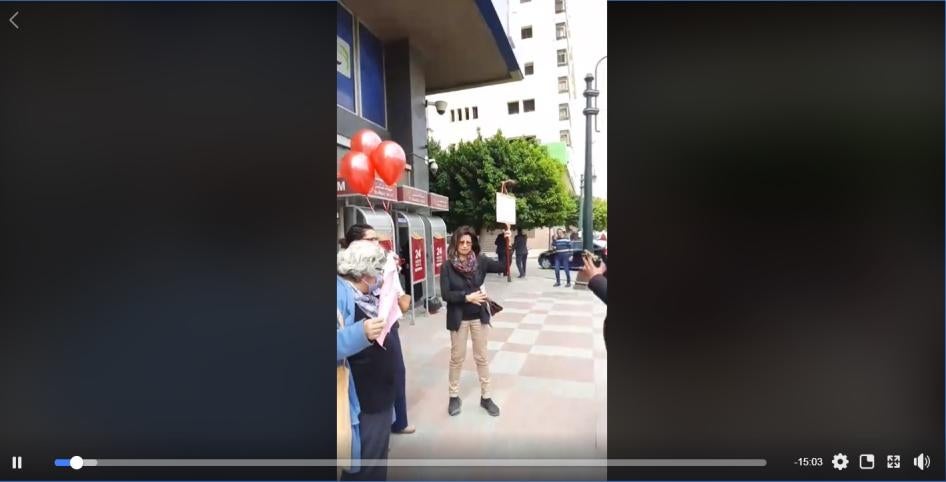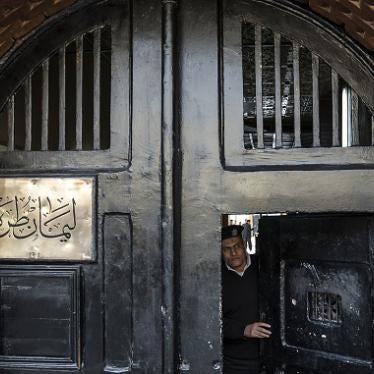(Beirut) – Egyptian authorities arrested 4 prominent women on March 18, 2020 as they protested to seek the release of unjustly detained prisoners over fears of COVID-19 virus, Human Rights Watch said today. The women were apparently demonstrating peacefully in downtown Cairo.
They are Laila Soueif, a Cairo University professor and mother of jailed activist Alaa Abdel Fattah; her sister, Ahdaf Soueif, a novelist; her daughter, Mona Seif Abdel Fattah; and Rabab al-Mahdi, a political science professor at the American University in Cairo. Prosecutors ordered them released on bail of EGP 5,000 each (US$318), accusing them of protesting without government permission and “spreading false news.” On March 19, instead of releasing her, the authorities sent Laila Soueif to State Security Prosecution, where she was interrogated again for hours before being released on a second financial bail of 3,000 ($190) in another case. The other 3 were released earlier on March 19, approximately 30 hours after their arrest.
“Instead of releasing people unjustly detained, the Egyptian authorities are silencing activists and relatives who speak up,” said Joe Stork, deputy Middle East and North Africa director at Human Rights Watch. “Families are right to be concerned over COVID-19 risks, and the authorities should listen.”
In a Facebook live stream, Mona Seif recorded the four women’s small protest before the cabinet building in downtown Cairo. “We are standing in front of the cabinet, demanding the state to take serious measures regarding coronavirus in prisons,” Seif said in the video. “Egypt's prisons, even in normal situations, are a disease-inviting environment.”
In the video, Seif said that they were calling for the release of her brother, Alaa Abdel Fattah, who has been in pretrial detention since September, and all other unjustly detained prisoners. Abdel Fattah had just finished serving five years in prison for earlier street protests when the authorities re-arrested him.
Concerns have increased over the spread of the COVID-19 virus after prison authorities banned all visits on March 10. Abdel Fattah’s family said they have not had any information from or about him since March 4.
A few minutes into the protest, Seif’s video shows police in uniforms and civilian clothes confronting them and asking them to end their protest. A high-ranking police officer appears in the video asking the women to “discuss the matter” at his nearby office. The video also showed the officer talking on the phone to an unknown person while loudly reading the signs the four held. After 15 minutes, the police took Seif’s phone and the recording ended abruptly.
Shortly afterward, Sanaa Seif, Mona’s sister, wrote on Facebook that the four were not at the protest site anymore and were not reachable on their phones. Sanaa Seif later said that she believed her family was being held in the nearby Qasr al-Nil police station and that she had been “dragged out” of the station without being allowed to see them.
Prosecutors at the Qasr al-Nil station interrogated the women and accused them of spreading false news regarding the government’s response to COVID-19 and calling for protests without permission, according to Facebook posts by their lawyer, Khaled Ali. Prosecutors then ordered them conditionally released, on payment of bail money.
“We have paid the bail and been waiting for the approval of the National Security [for their release],” Sanaa Seif posted on Facebook early on the morning of March 19.
Sanaa Seif told Human Rights Watch that her family members were not mistreated in Qasr al-Nil. The authorities removed her mother from Qasr al-Nil in the afternoon of March 19. The family learned later that she was taken to the State Security Prosecution office in an East Cairo suburb. Sanaa Seif said that her mother refused to answer prosecutors’ questions. Following hours of interrogation, prosecutors ordered her released on 3,000 bail ($190) in another case.
Ahdaf Soueif wrote in Facebook posts following her release that during their brief detention in Qasr al-Nil station, the 4 women were kept in a 2 by 2 meter room with 6 other women prisoners and that those prisoners had to order disinfectants to clean their cell with their own money. She said there were no precautions or regulations to prevent the spread of COVID-19 among the detainees.
On March 19, in a separate decision, the State Security Prosecution ordered the release of 15 detainees who have been in pretrial detention for months over charges related to their exercise of their right to free speech or association. Those released include a Cairo University professor, Hassan Nafaa, and a political activist, Hazem Abdel Azim.
Egyptian prisoners have long complained about inhuman and degrading conditions, saying that guards confiscate personal hygiene items such as soap, toothbrushes, toothpaste, and toilet paper. Proper ventilation and daylight are scarce. Human Rights Watch has said that the government should release all those unjustly detained for peaceful dissent and end the abusive use of pretrial detention.
“Instead of providing essential information and addressing the concerns of the public as well as prisoners and their families about prison conditions in the COVID-19 pandemic, Egypt’s government is squelching free speech and stifling basic rights.” Stork said.








